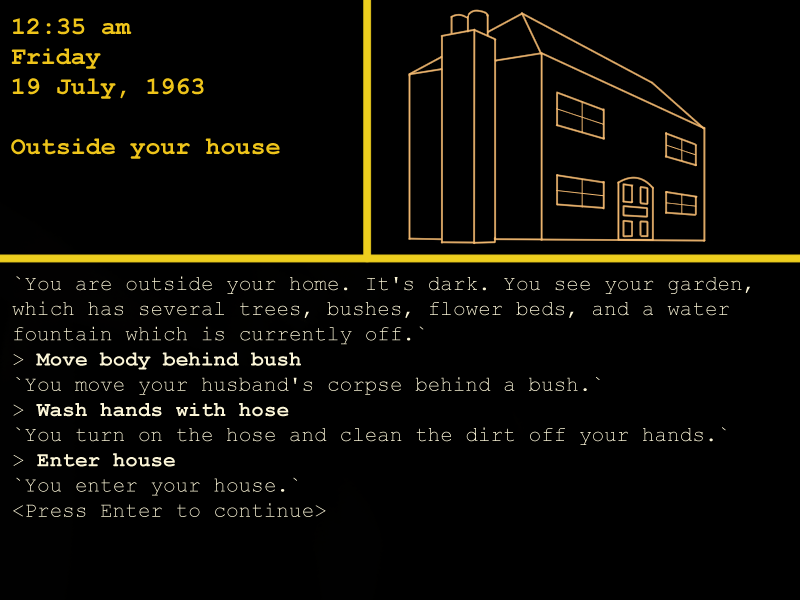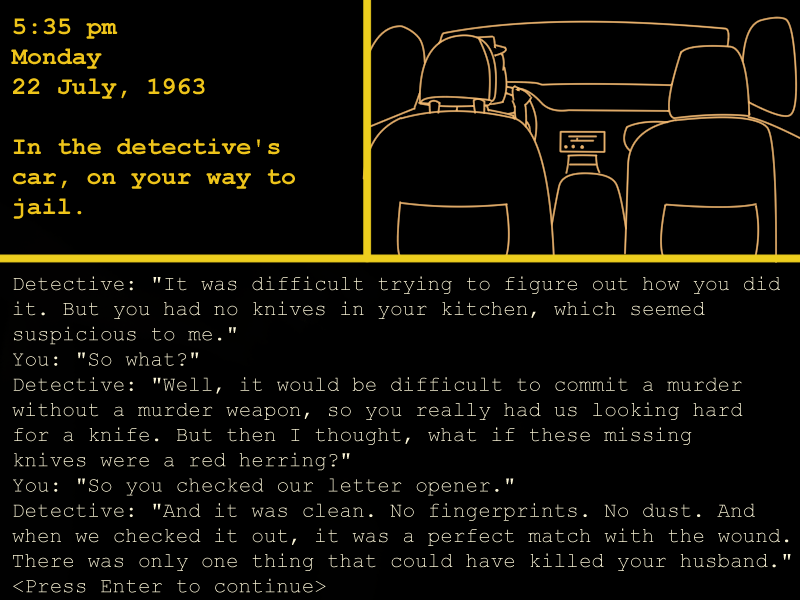Like Tetris, you are destined to lose I Killed My Husband. It is an exercise in lasting as long as you can before all the bricks you stacked become the obstacles that led to your demise.
The game starts with you standing over your husband’s dead body. It asks you some questions like where did you kill him, when, why, and how. And then the game is afoot. You need to get away with the murder.
The game is a text-based Columbo RPG/simulator where you play cat and mouse as the murderer versus the detective. He’s never given a name and is only ever called “detective.”

There’s a few tricks the game employs to keep the chase afoot. First, it does not tell you everything it’s tracking. In my first game I was not being clever at all and just hid my husband’s body in the garden. Then I was surprised later when the detective talked about there being dirt markings in strange places that led back to my room. So you learn to build a better murder as the detective tells you where you went wrong.
Second, you’re not playing as a blank slate. Your character has a personality and a social standing. You’re prevented from doing many gruesome things by you saying “I could never do such a thing.” Which occasionally catches the attention of the people around you, to humorous effect as you quickly make an excuse for your outburst.
During interactions with various other characters, especially the detective, the game provides you with a limited choice of dialogue. And while I personally would only ever say “I refuse to answer any questions and demand my right to attorney,” the person you’re playing as does not. They’re fallible. Sometimes you have to reveal information you’d rather not, or lie, or make some other mistake.
You can try to scramble to fix this.
Like one time I lied to the detective that a friend of mine could verify my alibi. Obviously he was going to check this, so I quickly called her, and she wasn’t home. So I drove to the tennis club she frequented (which I had learned about from a previous playthrough) to try to make sure she would corroborate my story. But the detective was already there, so I tried to insert myself into the conversation to force my alibi into the topic. Which then led to another loose end in my story: the friend said that she volunteered at a soup kitchen during the time of the murder. So I had to break into the soup kitchen at night to falsify their volunteer records. But the detective was already staking out the location waiting for me to make my move.

When you lose you end up in the back of the detective’s car, having a conversation about how he found you out.
It’s fascinating really. The game has the detective search, investigate, interrogate, and deduce. I don’t know how this game is possible. I’m a programmer, but I do not understand how anyone could create a game that feels this clever without pre-scripting all the interactions.
There’s just too many things you’re able to do. Too many things to interact with. Too many ways you can murder your husband. I’d almost sooner believe that this game was a product of magic than actual human endeavour.
I give I Killed My Husband ★★★★★ (5/5 stars)